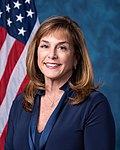A request that this article title be changed to Michigan's congressional delegations is under discussion . Please do not move this article until the discussion is closed. |

These are tables of congressional delegations from Michigan to the United States House of Representatives and the United States Senate.
Contents
- U.S. House of Representatives
- Current members
- Delegates from Michigan Territory
- Members of the House from Michigan
- United States Senate
- Senate delegation timeline (1835–present)
- Key
- See also
- Notes
- References
The current dean of the Michigan congressional delegation is Senator Gary Peters (D), having served in Congress since 2009.





























